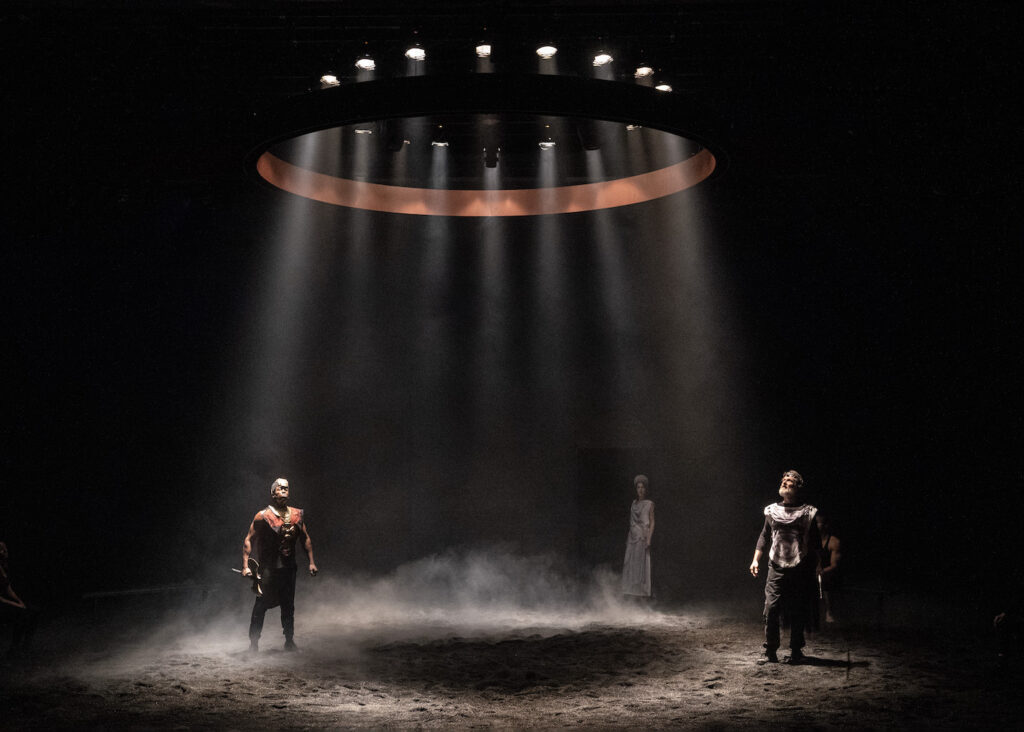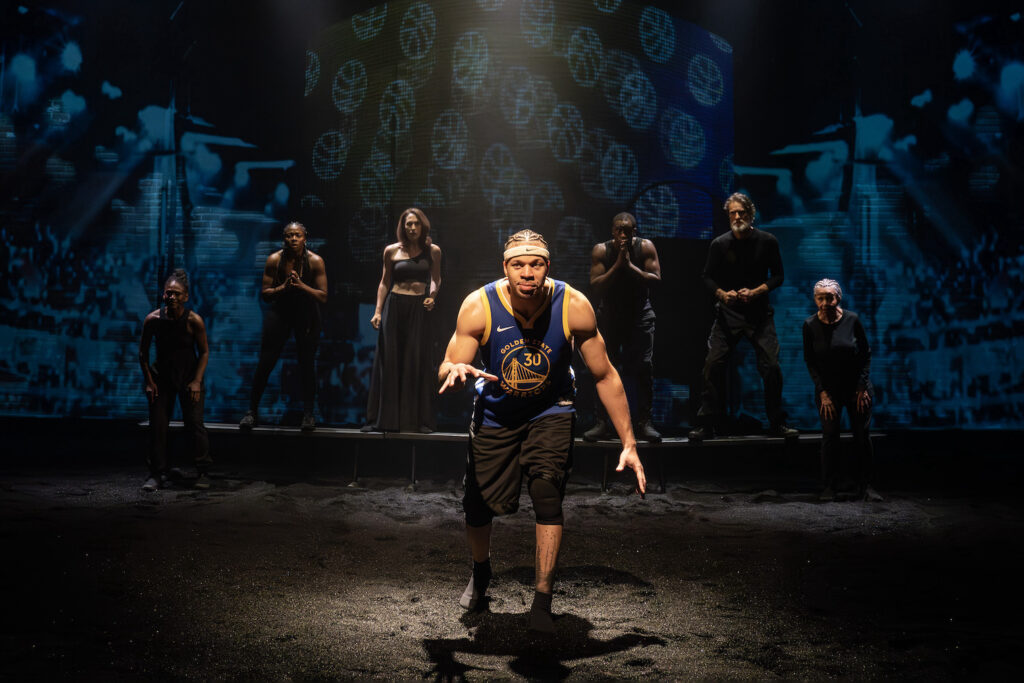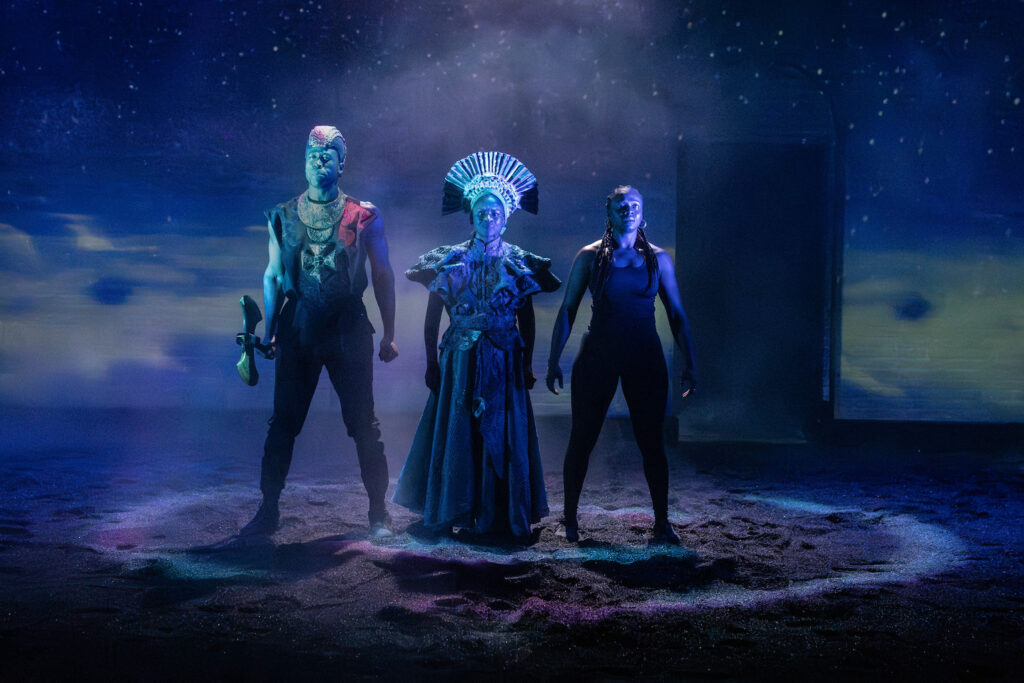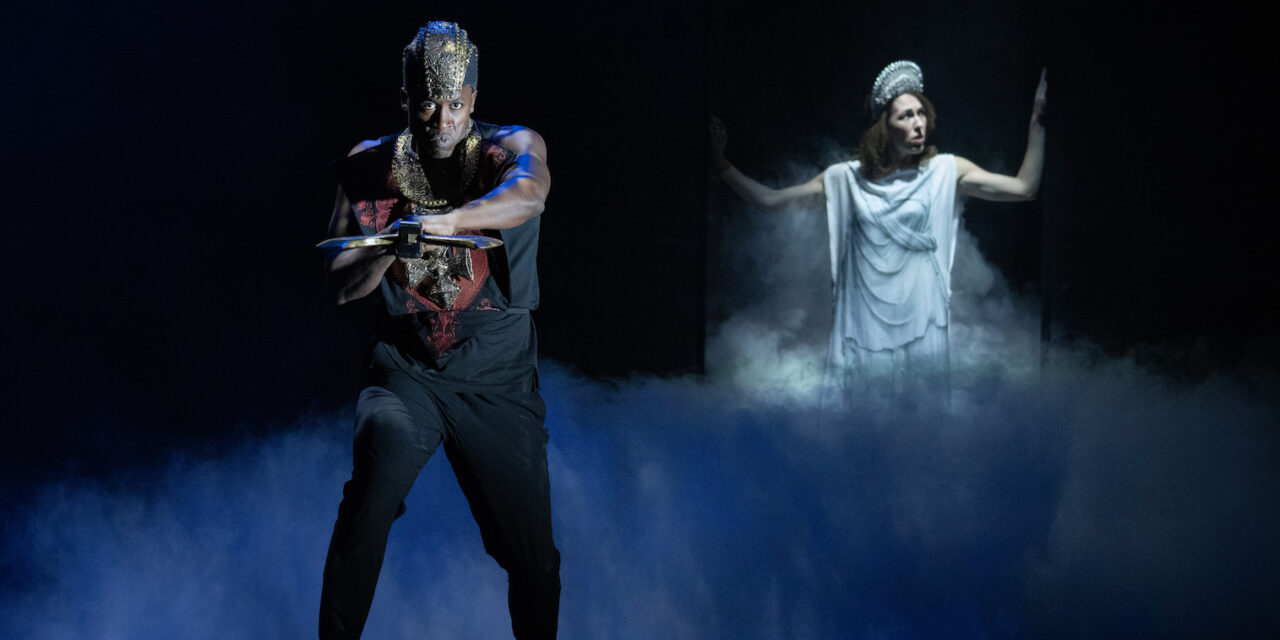By Samuel L. Leiter . . .
Already in this young season, three plays have dribbled with the game of basketball, King James, Flex, and Inua Ellams’s The Half-God of Rainfall, now at the New York Theatre Workshop (NYTW). The last named, I’m afraid, ambitious as it is, falls furthest from the hoop.
Ellams is a Nigerian-born, UK-based playwright and poet (among other artistic interests) whose epic poetic writing, as here, includes work in which he combines elements of mythology and symbolism, both West African and foreign, to explore basketball-themed material. The Half-God of Rainfall premiered in London in 2019 and was later developed into its present form, with additional performers, at the NYTW. Taibi Magar directs and Orlando Pabotoy handles the considerable “movement direction.”
The Half-God of Rainfall, combining high-flown poetic rhetoric with contemporary idiomatic speech, relates a story involving an assortment of Yoruba and classical Greek gods who war among themselves in a constant battle for power—chiefly represented by rivals Zeus (Michael Laurence), Greek God of Thunder, and Sangò (Jason Bowen), Orisha God of Thunder—while also meddling in human affairs. It’s presented in Story Theatre style with seven actors declaiming (the default acting style) both in the first and (mostly) third person, with narrative dominating dialogue.

Given the nature and style of this fantastical subject matter, it takes some effort to remember who is who, even after a direct-address prologue in which the actors introduce themselves and who they’re playing; devices like this do little more than highlight the artificiality of the dramatic circumstances, as if we’re being advised to keep our eyes open for the deeper significances.
In this case, the chief thematic purpose appears to be railing against the sexual abuse of women by powerful men, an idea that eventually comes into focus through circumstances in which Zeus—having cheated Sangò in a game, thereby winning control over one of his subjects—rapes the mortal Modúpé (Jennifer Mogbock); of course, this is much as he is known to have done with other victims (among them Leda, mother of Helen of Troy).
The outcome is a boy named Demi (Mister Fitzgerald). Despite being only 5’4”, this “half-god,” whose emotional reactions are strong enough to affect nature (rivers overflow, etc.), is ridiculed at first by his would-be village playmates, but soon he demonstrates his remarkable basketball skills.


Demi eventually plays for Nigeria in the Olympics, moves with his mother to America, and becomes an NBA star. (Some of the Nigerian basketball history referenced actually happened.) We also learn that a panoply of other hoop legends—all household names—were similarly the result of divine insemination. Demi’s American success, though, leads to additional difficulties when Zeus feels his own power diminishing as Demi’s grows. Eventually, in a clash of titans-style battle, the rigorously trained Modúpé overcomes and slays her nemesis, Zeus.
There’s a lot more here, of course, all of it staged within a spare set—by Riccardo Hernández—consisting of three towering walls surrounding a floor covered in a black, sand-like substance. The walls are used for a wide assortment of still and video images—created by Tal Yarden—ranging from rows of Olympian statues to phantasmagoric effects.
Stacey Derosier’s lighting works overtime to evoke a world beyond time, a downpour drenches the stage from an overhead circular track, and Mikaal Sulaiman underscores the action with a cacophony of otherworldly sounds and thunderstorm effects. The actors wear costumes by Linda Cho that effectively combine modern dress with classical components, including a striking, blue-green, traditional-style ensemble, crowned by a spiked tiara, worn by the river goddess Osún (Patrice Johnson Chevannes).


No mirrors are present but there’s plenty of smoke, with the fog machines working fulltime to enhance the godly atmosphere. All the actors move well (Pabotoy’s choreography is supplemented by Orisha movement credited to Beatrice Capote), are attractive and fit, and emotionally committed; even at 90 minutes, however, dramatic interest pales. The insistently oratorical sentences, richly imagistic as they often are, and even occasionally humorous, eventually grow tiresome, and the fanciful tale, based more on storytelling than action, weakens compelling human interest.
I applaud the cast—Lizan Mitchell’s Elegba and Kelley Curran’s Hera (and others) must not be overlooked—for its valiant work; and Magar for her theatrical staging, using a minimum of props, mainly weapons. Unlike the relatively realistic—and extended—basketball business in Flex, the game is given very limited stage time here, all of it in mime, including a ball that doesn’t exist.
The Half-God of Rainfall never made me believe in the phantasmagorical world it tries to conjure, nor did it significantly snare my sympathies toward its characters’ dilemmas. For all its storm and stress, it remained a cerebral experience. Which is to say, the play’s got game but isn’t a slam dunk.
The Half-God of Rainfall. Through August 20 at New York Theatre Workshop (79 East Fourth Street, between Second Avenue and The Bowery). 90 minutes, no intermission. www.nytw.org
Photos: Joan Marcus
Cover Photo: Jason Bowen and Kelley Curran


















